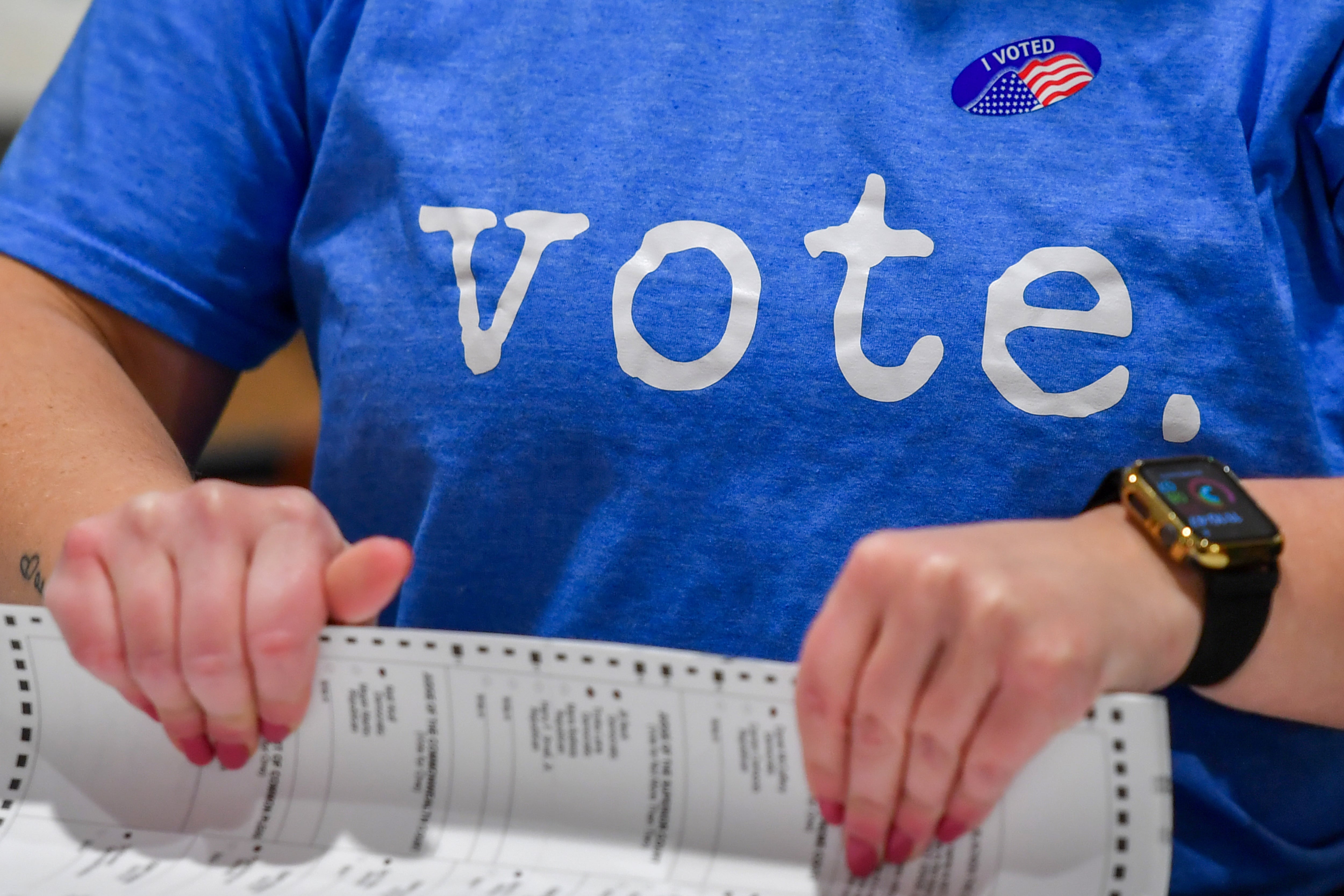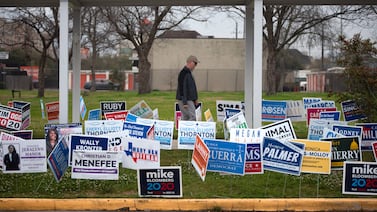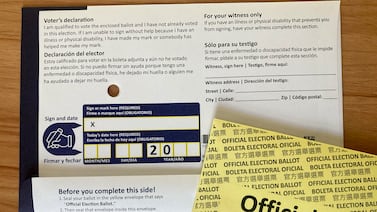Votebeat is a nonprofit news organization reporting on voting access and election administration across the U.S. A version of this post was originally distributed in Votebeat’s free weekly newsletter. Sign up to get it delivered to your inbox every Saturday.
Strap in, folks. It’s 2024. I hope you all enjoyed your holiday parties, because we are in it now.
I’ll cut straight to it: Things are looking a bit bleak, and it’s going to be a busy year.
Hand-counting has supplanted ending vote by mail as the Bad Idea of the Moment. The high rate of election worker turnover has not improved, and might actually be getting worse. And state legislatures continue to underfund election offices and pass legislation that makes already underpaid county workers have to work even harder. These, at least, are some of the things we’re thinking about as we figure out how to prioritize the thousands of voting stories we could write this year.
Let’s explore each:
Hand-counting
It confounds me that this idea still has such a grip on a large part of the Republican Party, but here we are. We wrote about it a lot last year, and we’re ready to write a lot about it this year, too. And we won’t even have to wait very long: In about three months, the local Republican party in Gillespie County, Texas, will hand-count its primary. And we anticipate another wave of advocacy on behalf of this terrible idea for November.
Turnover
Last year we watched even more election administrators make their way to the door, waving goodbye to the stress, low pay, and increasing harassment they report facing in huge numbers. That’s left us in a precarious place. In 2023, some counties across the country saw elections beset by avoidable error — often in places where the election administrator was relatively new. 2024 will place even more pressure on these brand-new county workers. We’ll be trying to assess the damage that’s already been done, while keeping track of the attempts to stem the tide.
Disappointing Lawmakers
State legislatures and Congress alike have been famously underfunding elections — despite having a lot of opinions about how they should work — for years. So, too, have they been passing laws that have adverse consequences, unintended or otherwise. We’ll be paying particular attention to how the voting bills passed in the wake of the 2020 election shake out for voters in their first presidential election since their passage. And we’ll keep track of any last minute attempts by lawmakers to issue one-time funding infusions, since we know they love to do that during election years.
Now, I’m going to turn it over to the rest of the folks at Votebeat, who will tell you what they’ll be keeping their eye on this year.
Jen Fifield, Arizona
Arizona enters 2024 in a precarious spot, with lingering challenges to both 2020 and 2022 elections still underway. How they play out could influence the 2024 election.
The way election-related indictments and lawsuits shake out over the course of the year could give voters some clarity, and maybe even some finality, by the time they head to the polls again in November.
By then, Attorney General Kris Mayes’ investigations of Cochise County supervisors and the 2020 fake electors will surely be over. Two Cochise supervisors’ refusal to certify their county’s 2022 election by the state deadline, along with the fake electors’ attempt here and in other states to overturn the 2020 election results, created uncertainty around those elections. By prosecuting those efforts, Mayes will make the consequences clear to voters, county supervisors, and activists seeking to undermine 2024′s results.
Of course, the rules for how elections are run may be clarified, too. Secretary of State Adrian Fontes’ new election procedures manual, which attempts to clarify rules on hand-counting ballots, voter intimidation, and many other aspects of elections, will be final — even if Republicans sue over them and the court has the final say on what is legal in the manual, and what isn’t. And pending lawsuits challenging how counties count mail ballots and whether unstaffed drop boxes are allowed will be decided — or, if not, status quo will apply for the 2024 election.
In the Legislature, there’s little optimism that the political stalemate between Republican lawmakers and Democratic Gov. Katie Hobbs will crack. That means we’ll keep our eyes on the counties and the courts, instead.
Jen’s favorite story she wrote in 2023: Arizona voters were told the election went fine. Records show a county director saw glaring errors, cashed out, then fled.
Oralandar Brand-Williams, Michigan
Michigan lawmakers have spent the past year revamping Michigan’s voting laws in ways aimed at boosting voter access. In late November, Gov. Gretchen Whitmer signed 23 new election and democracy bills into law.
In 2024, Votebeat will be watching to see how the new laws work during a presidential election.
The new laws include a minimum of nine days of early in-person voting, pre-registration of 16-years-olds who become eligible to vote at age 18, and — in 2025 — automatic voter registration of individuals leaving prison after serving their sentences. Now, thousands of local election officials across the state have to successfully put the new laws into effect.
Will the new laws get more people out to the polls to take part in this country’s democracy? We’ll be watching to see if the new laws will indeed prompt more participation.
Also, I will be watching to see how clerks are able to handle the extra days of voting and whether they can recruit the additional poll workers they’ll need to do so. Michigan election officials have put out a call for more poll workers.
The Legislature could also have more election bills coming. Michigan voters will be seeing a lot of changes to the system this year, and we’ll be watching how it goes.
Oralandar’s favorite story she wrote in 2023: Some communities are kicking off Michigan’s historic early voting with this fall’s municipal elections
Carter Walker, Pennsylvania
Like many states, Pennsylvania will be facing a deficit next year — in knowledge. We’re still gathering data, but it looks as if the state’s local election directors will collectively have 200 years less experience for this November’s election than they did at the start of 2020. We’ll be watching to see what that means for voters.
Many counties have lost decades of experience. Take Lebanon County, where the director and deputy administering the 2019 municipal election had 27 years of experience combined, compared to less than four years combined experience today. Other counties, such as Greene — which is on its sixth director since 2020 — have cycled through a host of election officials.
In 2022, Luzerne County showed us the problems election director turnover can cause. The constant churn of personnel led to a ballot paper shortage during the midterm election that brought national attention to the county. Pennsylvania saw more ballot errors this year than in any election year since no-excuse mail ballot voting went into effect. This loss of experience is probably the largest and most unappreciated election challenge facing the state this year.
So I’ll be paying attention, examining whether new directors can gain enough experience before the November election and whether the Department of State’s training programs are sufficient.
Carter’s favorite story he wrote in 2023: Why election problems continue to plague this northeast Pa. county
Natalia Contreras, Texas
A big chunk of my time in 2023 was spent reporting on a push by right-wing election conspiracy theorists to persuade Texas election officials to ditch electronic voting equipment and hand-count ballots instead. The topic was a point of contention among election officials this year, and it’s already having an impact on the planning of the March 2024 primary.
Counting ballots by hand has been widely proven to lead to errors, election lawsuits, and the potential disenfranchisement of voters. Nonetheless, fueled by election conspiracy theories, the GOP in one county — Gillespie, in the Texas Hill Country — will hand-count its primary election results without the help of the county’s elections department.
Although Republicans in Gillespie are the only ones making such a wholesale change, what happens there in March could be a powerful indicator of what’s to come for the remainder of 2024.
Will election skeptics be convinced this method isn’t reliable and put it to bed? Will it fuel calls for even more change in election legislation? How exactly will it impact voters’ trust in elections? We plan on being there to see how this plays out.
At least one other consequence of election conspiracy theories that I am keeping a close eye on in 2024 is the Texas withdrawal from ERIC, the multi-state coalition that helps states clean voter rolls and prevent voter fraud.
Natalia’s favorite story she wrote in 2023: Overlooked law requires election equipment that doesn’t exist, at a cost of $116 million
Carrie Levine, story editor
As always, I’ll spend 2024 trying to understand why some potentially damaging ideas — such as the hand-counting push — find traction around the country. Are such movements truly organic, or are there people promoting potentially disenfranchising methods for their own reasons?
Such questions will be increasingly important as Votebeat’s reporters cover the lead-up to a high-turnout, high-pressure presidential election, the first since 2020. Will democratic processes and customs hold? Will journalists be able to unravel the new conspiracy theories and false information that will certainly emerge?
Three years of turmoil over elections has pushed experienced election officials out of their jobs, forcing turnover at a critical time. It isn’t clear how that will affect 2024, but we’ll be watching.
Chad Lorenz, editor-in-chief
Votebeat’s mission is to help people understand our system of democracy so they can participate in strengthening it. Note that there’s a role for you in that mission, and we take that last part very seriously. Our journalism is designed with our readers in mind — not simply to inform them but give them information they can do something with: a prompt to participate in strengthening elections and voting, and the knowledge that they will need in order to do it.
As an editor, I often imagine the proverbial reader sitting at their desk finishing one of our articles and reacting to what they just learned. As I picture them, the reaction I would least want to see is a reader stroking their chin and murmuring, “Hmmm, how interesting.” I don’t want Votebeat readers passively musing that our journalism is interesting. I want them pounding a fist into their palm and huffing, “That sounds messed up!” or “There’s got to be a better way!” or “Yes, what a fantastic idea for making elections better!”
Whether you run elections for your county, or you make decisions about elections in your state, or you are working to improve voting for a nonprofit, or you are simply someone who cares about your ability to vote, Votebeat journalism is here not just to inspire your reaction but also your action.
One of my favorite kinds of messages in our newsroom’s chat system is when a reporter pings us to say that they just heard residents talk at a county board meeting about one of our stories — lately Cochise County, Arizona — and that those residents voiced their opinion to local officials about some major election issue we raised. Or when a reporter says that lawmakers referred to Votebeat reporting on the floor of the legislature, as has happened a few times this year in Texas.
That’s why in 2024, we aim to produce more journalism that you can use to do your part in strengthening our democracy. We have lots of ideas, but we would be more confident if we could hear it from you. Read on for more about that..
Lauren Aguirre, engagement editor
In 2024, I’m going to be keeping readers like you in mind.
Seriously.
We can’t know whether we’re achieving our mission if we’re not hearing from our readers — we want to know your questions, concerns, and thoughts about voting and elections. When you see reporters asking for you to reply to their newsletters, or you see us circulating surveys to gather different ideas or experiences from readers, it’s in earnest. We see every response, discuss many of them, and I often personally reach out to readers to continue the conversation.
We want to hear from you about how our reporting helps you, or answers your questions — it’s how we can gauge how well we’re serving our mission.
How has our reporting helped you understand our elections? Have you taken any actions after reading our work? What else should we look into and report about? Please tell us! You can reply to this email to share your experiences. And don’t forget to fill out our currently open survey gathering what you want to know about elections for 2024.








